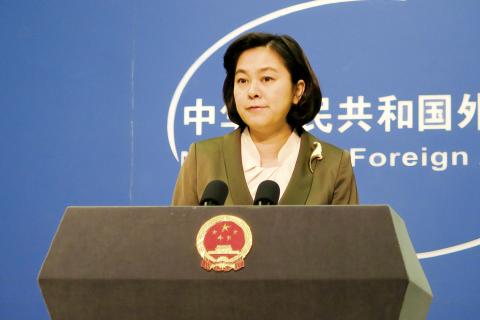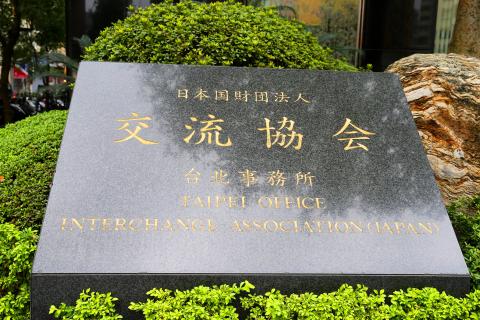The Ministry of Foreign Affairs yesterday expressed support for the planned renaming of the Interchange Association, Japan to the Japan-Taiwan Exchange Association from Sunday.
The association represents Japan’s interests in Taiwan in the absence of bilateral diplomatic ties, which ended in 1972. Taiwan also set up a de facto embassy with an ambiguous title in Tokyo, called the Association of East Asian Relations, which was renamed the Taipei Economic and Cultural Representative Office in Japan in 1992.
The ministry said that the new name reflects the business activities carried out by the association and is a positive development in Taiwan-Japan relations.

Photo: CNA
Saying that the two nations have become closer in recent years, the ministry added that Japan is Taiwan’s third-largest trade partner, while Taiwan is Japan’s fourth-largest. Bilateral trade totaled US$57.9 billion last year.
In addition, there were 5.3 million travelers between Taiwan and Japan last year and that number could surpass 6 million this year, the ministry said.
Taiwan and Japan share the universal values of democratic governance, freedom and the rule of law, with various public opinion polls showing the close and friendly relations between Taiwanese and Japanese, the ministry said, while expressing the hope that the two will continue to expand and deepen mutually beneficial cooperation.

Photo: CNA
The move could represent the greatest breakthrough since the foundation was established in 1972 after official diplomatic ties between the two nations were severed, and is expected to further Taiwan-Japan relations.
Former leader Chiang Kai-shek’s (蔣介石) administration proposed that the Japan-based association be named the Japan-China Interchange Foundation, which Tokyo rejected, anonymous sources said.
Like its Taiwanese counterpart, the then-Association of East Asian Relations, their vague appellations caused bafflement as to what their purposes were.
The sources said that the timing of the name change was because “times have changed,” which has manifested itself in several ways.
“In the 1980s and 1990s, there were not many substantial exchanges between Japan and Taiwan, but the total number of tourists visiting both nations has surpassed 6 million in recent years, and exchanges have been plentiful on a wide range of issues,” the sources said.
A recent survey by the Japanese government found that only 10 percent of Taiwanese respondents said they knew what “the functions of the Interchange Association, Japan, were, while 80 percent said the opposite, the sources said.
Association officials did not confirm if the name change signals a deepening of Taipei-Tokyo relations, but dismissed speculation that the move was inspired by US president-elect Donald Trump’s perceived stance on Taiwan, saying that it was planned, a source said.
A Japanese official said that it was “Taiwan’s business” if it changes the name of the Taipei Economic and Cultural Representative Office in Japan to the Taiwan Economic and Cultural Representative Office in Japan, but added that the potential political implications should be assessed before a change is made, the source said.
Japanese officials said that Taiwan submitted a request to change the representative office title during former representative to Japan Koh Se-kai’s (許世楷) term between 2004 and 2008, adding that the ministry has never made such a request.
“China remains firm and consistent on issues regarding Taiwan affairs. We strongly oppose any attempts at creating the frameworks of ‘one China, one Taiwan’ or ‘two China’s.’ We express our strong protest against Japan’s passive stance over Taiwan affairs,” Chinese Ministry of Foreign Affairs spokeswoman Hua Chunying (華春瑩) said at a news conference in Beijing in response to the proposed name change.
“China urges Japan to adhere to the principles set forth in the Japan-China Joint Communique and honor the promises it has made to China, uphold the ‘one China’ principle and refrain from sending false signals to Taiwan and the international community, thereby causing new problems to China-Japan relations,” she said.
China has initiated negotiations with Japan over the issue, she said.

INVESTIGATION: The case is the latest instance of a DPP figure being implicated in an espionage network accused of allegedly leaking information to Chinese intelligence Democratic Progressive Party (DPP) member Ho Jen-chieh (何仁傑) was detained and held incommunicado yesterday on suspicion of spying for China during his tenure as assistant to then-minister of foreign affairs Joseph Wu (吳釗燮). The Taipei District Prosecutors’ Office said Ho was implicated during its investigation into alleged spying activities by former Presidential Office consultant Wu Shang-yu (吳尚雨). Prosecutors said there is reason to believe Ho breached the National Security Act (國家安全法) by leaking classified Ministry of Foreign Affairs information to Chinese intelligence. Following interrogation, prosecutors petitioned the Taipei District Court to detain Ho, citing concerns over potential collusion or tampering of evidence. The

Seventy percent of middle and elementary schools now conduct English classes entirely in English, the Ministry of Education said, as it encourages schools nationwide to adopt this practice Minister of Education (MOE) Cheng Ying-yao (鄭英耀) is scheduled to present a report on the government’s bilingual education policy to the Legislative Yuan’s Education and Culture Committee today. The report would outline strategies aimed at expanding access to education, reducing regional disparities and improving talent cultivation. Implementation of bilingual education policies has varied across local governments, occasionally drawing public criticism. For example, some schools have required teachers of non-English subjects to pass English proficiency

‘FORM OF PROTEST’: The German Institute Taipei said it was ‘shocked’ to see Nazi symbolism used in connection with political aims as it condemned the incident Sung Chien-liang (宋建樑), who led efforts to recall Democratic Progressive Party (DPP) Legislator Lee Kun-cheng (李坤城), was released on bail of NT$80,000 yesterday amid an outcry over a Nazi armband he wore to questioning the night before. Sung arrived at the New Taipei City District Prosecutors’ Office for questioning in a recall petition forgery case on Tuesday night wearing a red armband bearing a swastika, carrying a copy of Adolf Hitler’s Mein Kampf and giving a Nazi salute. Sung left the building at 1:15am without the armband and apparently covering the book with a coat. This is a serious international scandal and Chinese

NEGOTIATIONS: The US response to the countermeasures and plans Taiwan presented has been positive, including boosting procurement and investment, the president said Taiwan is included in the first group for trade negotiations with the US, President William Lai (賴清德) said yesterday, as he seeks to shield Taiwanese exporters from a 32 percent tariff. In Washington, US Trade Representative Jamieson Greer said in an interview on Fox News on Thursday that he would speak to his Taiwanese and Israeli counterparts yesterday about tariffs after holding a long discussion with the Vietnamese earlier. US President Donald Trump on Wednesday postponed punishing levies on multiple trade partners, including Taiwan, for three months after trillions of US dollars were wiped off global markets. He has maintained a 10 percent